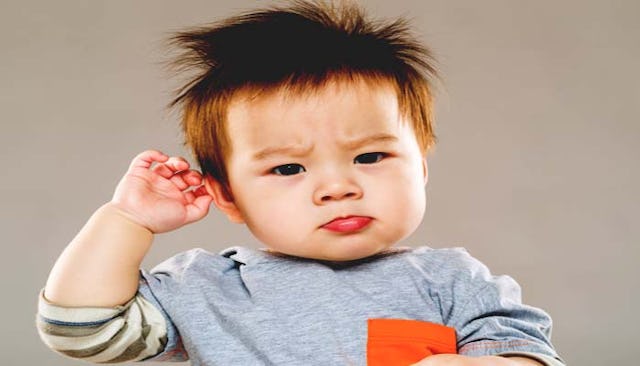It's Not A Big Deal That My Son Has A 'Pee-Pee' Instead Of A 'Penis'

There’s a laundry list of things that seem like a great idea in theory, then I try to execute them and fail miserably. Getting my kids to use the anatomically correct names for body parts is one of them. My four-year-old calls his penis a ‘pee pee.’ It’s the chosen name for my two-year-old’s vagina, too.
I’m admittedly a very impressionable parent, mostly because I never really know what I’m doing. So if a parent says something to me like, “I only allow my child to drink four ounces of juice a day, as per the American Academy of Pediatrics,” I immediately think, “Oh, shit. That’s a great idea. I should follow the American Academy of Pediatrics’ recommendations, too.” Then my kid asks for a juice box, I tell him he’s already had his recommended dose for the day, he looks at me like I’m a total asshole — and I fold. So my kid may actually get eight ounces of juice a day, or maybe even ten. That’s just the kind of failure I am.
In the same vein, I once read an article I thoroughly enjoyed about a Mom who insists on teaching her kids the anatomically correct names for body parts. “She’s a genius,” I remember thinking after I read it. I have no hang-ups about the words “penis” or “vagina” so I made a mental note to remember to avoid little cutesy names for them when the time came. I read another article that claimed using euphemisms instead of the words “penis” and “vagina” teaches kids to feel shame about their bodies. I bought it all — hook, line, and sinker, because again – that’s just the kind of parent I am. “I’m a body-positive feminist! I don’t want my kids to feel shame!”
Dr. Sears backs this up, too:
“It’s extremely important to use accurate terms. Starting at this early age, you want your child to learn that she can depend on you to be a trustworthy and easily approachable source of information, especially on sensitive issues. You’re laying the groundwork for the more in-depth and challenging sexuality talks that will come when she’s a teen.”
So I may be damaging my relationship with my future teen because I call his penis a “pee-pee?” Shit.
The months went on, and I realized I was still calling my child’s penis a “pee-pee.” and I made an attempt to turn it around. I sat him down and said, your “pee-pee” is actually called a “penis.” Cool?” Days went by and it quickly became evident that I had missed my window of making this new terminology stick, as per the pop quizzes I would occasionally give my child:
“What’s that called?” I’d ask.
Blank stare and look of confusion would inevitably come from my child. His mouth said nothing, but his face said, “What the hell, mom?”
I realized that we just don’t really talk about penises enough for this to really be an issue. I know there’s a concern about children being able to correctly label their body parts to help them describe if any abuse occurs. This is a very legitimate concern, and one I take seriously. I’ve several times given him the “you’re the only one who’s allowed to touch your penis” talk, and let him know to tell me if anyone one ever made him feel uncomfortable or attempted to touch him there. He said, “Yes mommy, I know. No one is allowed to touch my pee-pee but me.”
So, we don’t use anatomically correct words in my house. Oh, well. But in a place where a bottle is a “ba-ba,” a pacifier is a “binky” and Grandma is “Ya-Ya” — does it really matter? This is probably just another fail on my part, but there are tons of words we baby-talk to little kids. I’m okay with “penis” being one of them.
Related post: Your Penis Won’t Fall Off And Other Things Boys Should Know
This article was originally published on